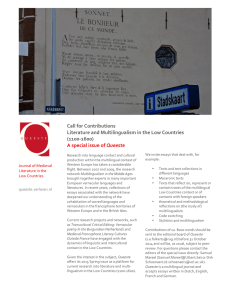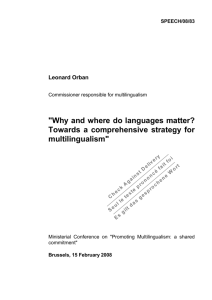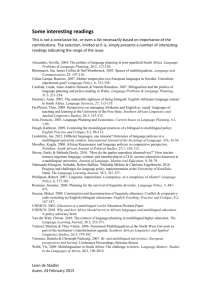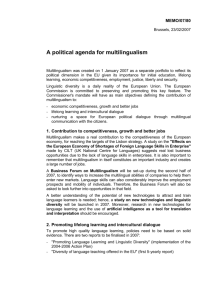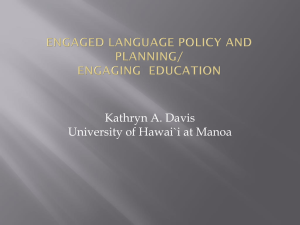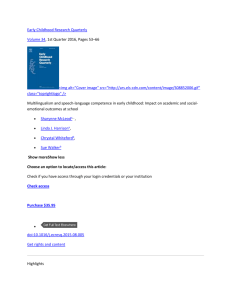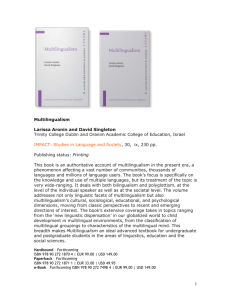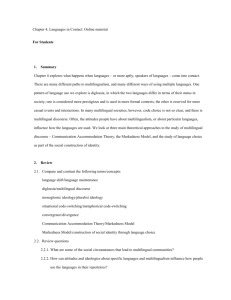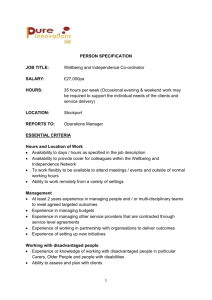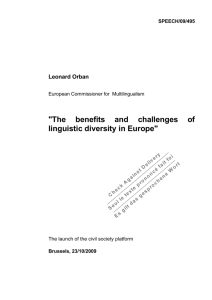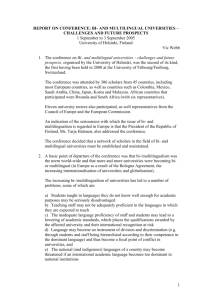DOC - Europa
advertisement
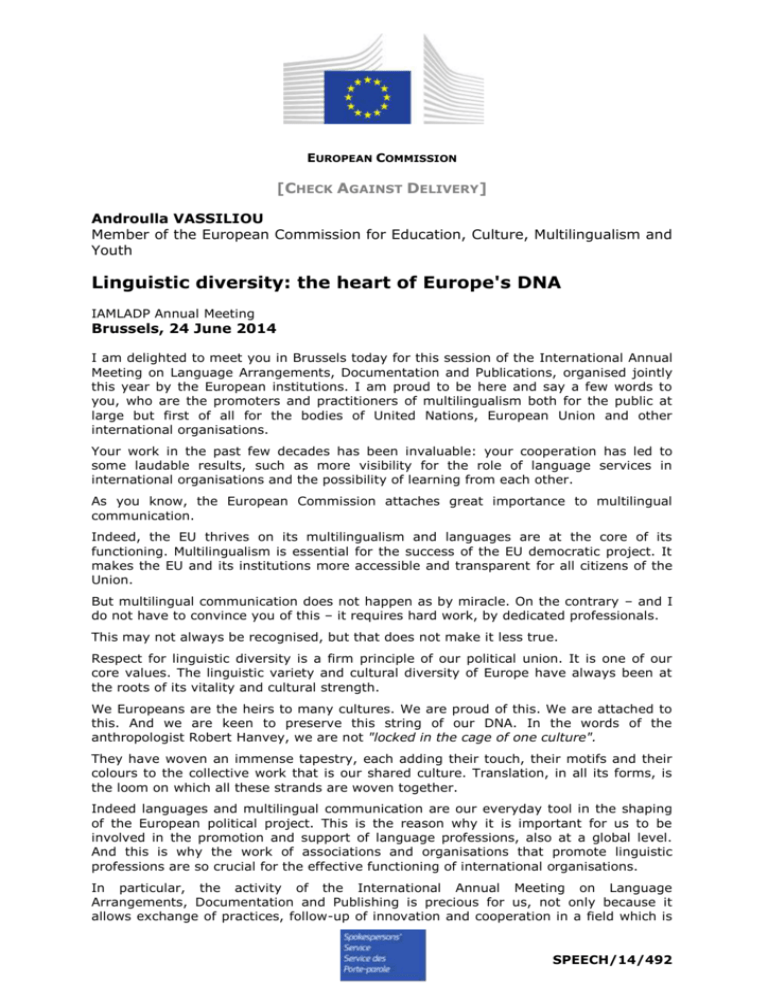
EUROPEAN COMMISSION [CHECK AGAINST DELIVERY] Androulla VASSILIOU Member of the European Commission for Education, Culture, Multilingualism and Youth Linguistic diversity: the heart of Europe's DNA IAMLADP Annual Meeting Brussels, 24 June 2014 I am delighted to meet you in Brussels today for this session of the International Annual Meeting on Language Arrangements, Documentation and Publications, organised jointly this year by the European institutions. I am proud to be here and say a few words to you, who are the promoters and practitioners of multilingualism both for the public at large but first of all for the bodies of United Nations, European Union and other international organisations. Your work in the past few decades has been invaluable: your cooperation has led to some laudable results, such as more visibility for the role of language services in international organisations and the possibility of learning from each other. As you know, the European Commission attaches great importance to multilingual communication. Indeed, the EU thrives on its multilingualism and languages are at the core of its functioning. Multilingualism is essential for the success of the EU democratic project. It makes the EU and its institutions more accessible and transparent for all citizens of the Union. But multilingual communication does not happen as by miracle. On the contrary – and I do not have to convince you of this – it requires hard work, by dedicated professionals. This may not always be recognised, but that does not make it less true. Respect for linguistic diversity is a firm principle of our political union. It is one of our core values. The linguistic variety and cultural diversity of Europe have always been at the roots of its vitality and cultural strength. We Europeans are the heirs to many cultures. We are proud of this. We are attached to this. And we are keen to preserve this string of our DNA. In the words of the anthropologist Robert Hanvey, we are not "locked in the cage of one culture". They have woven an immense tapestry, each adding their touch, their motifs and their colours to the collective work that is our shared culture. Translation, in all its forms, is the loom on which all these strands are woven together. Indeed languages and multilingual communication are our everyday tool in the shaping of the European political project. This is the reason why it is important for us to be involved in the promotion and support of language professions, also at a global level. And this is why the work of associations and organisations that promote linguistic professions are so crucial for the effective functioning of international organisations. In particular, the activity of the International Annual Meeting on Language Arrangements, Documentation and Publishing is precious for us, not only because it allows exchange of practices, follow-up of innovation and cooperation in a field which is SPEECH/14/492 so important for the European Union, but also because it helps us promote language diversity and multicultural dialogue in the whole world. And where there is multilingualism on an equal basis, there are equal rights and mutual understanding, values which the European Union strongly cherishes and supports all over the world. Indeed, languages are also a political tool and I am glad to see that your partnership contributes to the enhancement of other international organisations, supporting interpreter courses, most recently also in African universities. The more states and governments talk to each other, the more there will be peace, equality and prosperity in our world. Ladies and gentlemen, Interpreters and translators play a crucial role in our organisations. They oil the wheels of international cooperation. Not only they make communication possible, but with their work and their presence in our institutions, they have contributed to the development of a true political culture that has multilingualism at its core and that is spreading to our societies. But our organisations do change, and so the skills needed by our language professionals. Increasing volumes and an increasing on-line presence are changing the way we meet the multilingual needs of our citizens. At the European Commission, we launched last year a new machine translation system, MT@EC, which is to be the building block for a number of multilingual digital services that can be used by all Europeans. To keep up with the ever-changing needs of our organisations and their audiences, the language professions have to evolve, to adapt to technological innovation, to adopt new working methods, in a constant challenge for modernisation. Translators and interpreters are expected to possess a larger portfolio of skills, acquired both formally and informally. The European Commission is particularly advanced in this area of professional requirements for translators and interpreters. It has developed the European Master's in Translation and the European Master's in Conference Interpreting, which have defined the core skills needed by translators and conference interpreters to gain access to their respective professions. But lifelong learning in the knowledge-intensive professions of translation and interpretation remains central to, if not vital for, their survival and their ability to manage constant change. Lifelong learning is a must. A partnership like yours contributes exactly to this incessant process which is essential to the functioning of our institutions. Cooperation and knowledge sharing between organisations can help identify emerging learning needs and respond to these needs promptly. The wealth of knowledge that you as public language services have at your disposal through this forum is unmatched by anything that outside training institutes or consultancies could offer. I can therefore only encourage you to continue your efforts in the field of training. I was particularly interested in hearing about the Joint Training Ventures. Pooling resources to support our linguists’ lifelong learning has proven to be a simple, efficient and cost-effective training tool. And as Commissioner for education I know that cooperation with universities is equally important. It helps us to highlight the skills that can improve graduates' employability. It can provide practical recognition for the vocational skills, knowledge and development 2 acquired by our linguists on the ground. And finally it can help us identify new specialisation areas where we will need to attract language professionals. Ladies and gentlemen, Let me conclude by applauding your work, and the work of IAMLADP, in enhancing the efficiency, quality and cost-effectiveness of the language services of international organisations. By raising awareness of common challenges you enable language professions to advance for the common good. I praise your initiative in formulating a position on lifelong learning, 'The Brussels Statement', which I hope will be adopted by all the parties represented here at this gathering and made available in the public domain. Rightly so, as I am firmly convinced that Lifelong Learning is relevant to everyone. I wish you fruitful discussions and I hope that the multilingual spirit that you keep alight will continue to spread in the global society. 3
